
Generative AI Faces Escalating Regulatory Tighten
The rise of interactive artificial intelligence (AI) “ChatGPT”, which is described with words such as shock and destruction. Because of its ease of use, many people fear about its abuse and misuse. Even if the actual harm and concern which AI brings is minor, it creates a huge sense of suspicion and even evokes a scenario of Human extinction. Regulations are getting tougher.
| Advertisement | |
It was Italy that started the regulations. At the end of March, four months after release of ChatGPT, it was banned from use in Italy, due to problems with the collection and management of personal information. The ban was lifted after a month, but it triggered growing skepticism about ChatGPT among EU and its member states.

The EU adheres to its traditional strict policies, such as the General Data Protection Regulation (GDPR), which required companies that handle personal information within the region to ensure throughout management.
A comprehensive bill on AI has also been debated for years, but in June, parliament adopted an amendment that tightened the treatment of generative AI. The regulation network will be further strengthened.
At the same time that Italy announced its ban, in United States and open letter on AI regulation became a hot topics. Tech company Elon Musk and others signed the petition, requesting on development of high-performance AI shall be suspended, that surpasses ChatGPT’s core technology.
"Reducing the risk of human extinction by AI is a global priority issue alongside nuclear war." In May, the US nonprofit Center for AI Safety issued a disturbing statement. He sounded the alarm on the remarkable progress of AI and called for urgent countermeasures. The statement was also signed by people involved in the matter, such as Sam Altman, CEO of OpenAI, which works on ChatGPT, and Google's AI chief.
Wariness and cautiousness about AI extends to the United Nations. In June, Secretary-General Guterres endorsed the creation of a new international organization, such as the International Atomic Energy Agency (IAEA) to regulate AI.
Altman is a sensitive reader of the movement of skeptics. At a U.S. Senate hearing in May, he advocated the introduction of licensing system for development of high-level AI. However, some see this as a pose to distract from criticism of ChatGPT’s practical glitches.
He also explained that there are “technical limitations” in the operation of ChatGPT in the EU, where AL legislation is progressing. If it fails to comply with the law, it could even imply suspension of business in the EU.
On the other hand, the UK draws a line with the EU, that already left. Decided to hold the fist summit on the theme of AI safety within 2023 by bringing their own color. Although the world is beginning to come to a commonunderstanding that regulation of AI is necessary, the expectations of each country and company are intricately intertwined in order to seize the initiative.
When asking ChatGPT, they replied, “Regulations are a means to support appropriate use and pursuit of profit without impending the progress of AI technology.” Extremely true. However, the runway of AI is still a concern. Rather, at this point, it might be better to say that it is a concern about the recklessness and dissonance between the country and the people who move the country.
#ChatGPT #GenerativeAI #ai #Mreport #ข่าวอุตสาหกรรม
Source: Nikkan Kogyo Shimbun







